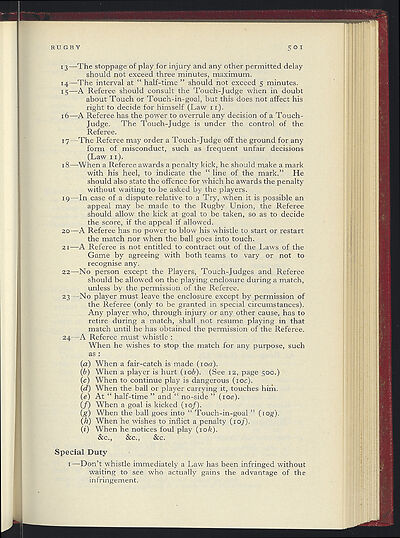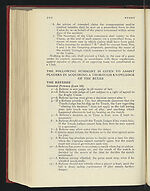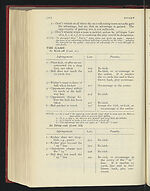1939-40
(525)
Download files
Complete book:
Individual page:
Thumbnail gallery: Grid view | List view

RUGBY 50I
13
—The stoppage of play for injury and any other permitted delay
should not exceed three minutes, maximum.
14—The interval at " half-time " should not exceed 5 minutes.
15
—A Referee should consult the Touch-Judge when in doubt
about Touch or Touch-in-goal, but this does not affect his
right to decide for himself (Law
I I ).
16
—A Referee has the power to overrule any decision of a Touch-
Judge. The Touch-Judge is under the control of the
Referee.
17—The Referee may order a Touch-Judge off the ground for any
form of misconduct, such as frequent unfair decisions
(Law
II).
18
—When a Referee awards a penalty kick, he should make a mark
with his heel, to indicate the " line of the mark." He
should also state the offence for which he awards the penalty
without waiting to be asked by the players.
Iq
—In case of a dispute relative to a Try, when it is possible an
appeal may be made to the Rugby Union, the Referee
should allow the kick at goal to be taken, so as to decide
the score, if the appeal if allowed.
20
—A Referee has no power to blow his whistle to start or restart
the match nor when the ball goes into touch.
21
—A Referee is not entitled to contract out of the Laws of the
Game by agreeing with both teams to vary or not to
recognise any.
22
—No person except the Players, Touch-Judges and Referee
should be allowed on the playing enclosure during a match,
unless by the permission of the Referee.
23—No player must leave the enclosure except by permission of
the Referee (only to be granted in special circumstances).
Any player who, through injury or any other cause, has to
retire during a match, shall . not resume playing in that
match until he has obtained the permission of the Referee.
24—A Referee must whistle:
When he wishes to stop the match for any purpose, such
as :
(a) When a fair-catch is made (ioa).
(b) When a player is hurt
(Iob).
(See
12,
page
500.)
(c) When to continue play is dangerous (toc).
(d) When the ball or player carrying it, touches him.
(e) At " half-time " and " no-side " (Ioe).
(f) When a goal is kicked
(1
of).
(g) When the ball goes into " Touch-in-goal " (
1
og).
(h) When he wishes to inflict a penalty
(Ioj).
(i) When he notices foul play (iok).
&c., &c., &c.
Special Duty
1
—Don't whistle immediately a Law has been infringed without
waiting to see who actually gains the advantage of the
infringement.
13
—The stoppage of play for injury and any other permitted delay
should not exceed three minutes, maximum.
14—The interval at " half-time " should not exceed 5 minutes.
15
—A Referee should consult the Touch-Judge when in doubt
about Touch or Touch-in-goal, but this does not affect his
right to decide for himself (Law
I I ).
16
—A Referee has the power to overrule any decision of a Touch-
Judge. The Touch-Judge is under the control of the
Referee.
17—The Referee may order a Touch-Judge off the ground for any
form of misconduct, such as frequent unfair decisions
(Law
II).
18
—When a Referee awards a penalty kick, he should make a mark
with his heel, to indicate the " line of the mark." He
should also state the offence for which he awards the penalty
without waiting to be asked by the players.
Iq
—In case of a dispute relative to a Try, when it is possible an
appeal may be made to the Rugby Union, the Referee
should allow the kick at goal to be taken, so as to decide
the score, if the appeal if allowed.
20
—A Referee has no power to blow his whistle to start or restart
the match nor when the ball goes into touch.
21
—A Referee is not entitled to contract out of the Laws of the
Game by agreeing with both teams to vary or not to
recognise any.
22
—No person except the Players, Touch-Judges and Referee
should be allowed on the playing enclosure during a match,
unless by the permission of the Referee.
23—No player must leave the enclosure except by permission of
the Referee (only to be granted in special circumstances).
Any player who, through injury or any other cause, has to
retire during a match, shall . not resume playing in that
match until he has obtained the permission of the Referee.
24—A Referee must whistle:
When he wishes to stop the match for any purpose, such
as :
(a) When a fair-catch is made (ioa).
(b) When a player is hurt
(Iob).
(See
12,
page
500.)
(c) When to continue play is dangerous (toc).
(d) When the ball or player carrying it, touches him.
(e) At " half-time " and " no-side " (Ioe).
(f) When a goal is kicked
(1
of).
(g) When the ball goes into " Touch-in-goal " (
1
og).
(h) When he wishes to inflict a penalty
(Ioj).
(i) When he notices foul play (iok).
&c., &c., &c.
Special Duty
1
—Don't whistle immediately a Law has been infringed without
waiting to see who actually gains the advantage of the
infringement.
Set display mode to:
![]() Universal Viewer |
Universal Viewer | ![]() Mirador |
Large image | Transcription
Mirador |
Large image | Transcription
| Games and sports in the army > 1939-40 > (525) |
|---|
| Permanent URL | https://digital.nls.uk/248753025 |
|---|
| Description | 'Games and Sports in the Army' was an annual publication produced by the British War Office between the 1930s and 1960s. This included the Second World War. It outlines the rules and regulations for games and sports played by members of the armed forces. It features names and photographs of team members, and examples of contemporary advertising. |
|---|---|
| Shelfmark | GWB.52 |

